 "ranwhenparked" (ranwhenparked)
"ranwhenparked" (ranwhenparked)
08/02/2014 at 16:40 Filed to: shiplopnik, ships, united states lines
 3
3
 9
9
 "ranwhenparked" (ranwhenparked)
"ranwhenparked" (ranwhenparked)
08/02/2014 at 16:40 Filed to: shiplopnik, ships, united states lines |  3 3
|  9 9 |
Disclaimer: I'm on vacation this week and kind of bored, so I thought I'd throw something out there and see if anyone finds it as interesting as I do. If not, no big deal.
I've always been fascinated with ships and the shipping industry (almost pursued a career in it, long story, regret, etc), and lately I've been reading more about the last days of United States Lines and found a lot of the details interesting. The Oil Crisis of the 1970s hurt pretty much everyone and it goes without saying that the shipping industry was affected significantly. Traditional steamships were becoming uneconomical to operate due to excessive fuel consumption and more than one company went bankrupt and shut down entirely, primarily due to fuel costs. In the midst of this, Malcolm McLean, the founder of McLean Trucking and Sea-Land Service and the visionary behind containerization, bought control of the venerable United States Lines in 1978 and set about solving the problem. McLean's vision was twofold: 1) build bigger ships bigger vessels can carry more cargo, creating better economies of scale to offset operating costs, and 2) build more fuel efficient ships.
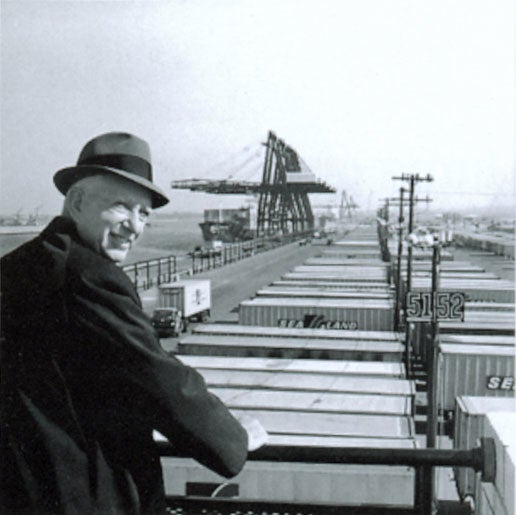
(credit: Wikipedia)
In the late 1970s, the most reliable industry forecasts saw the era of high oil prices lasting indefinitely, and it was projected that the price per barrel would double by 1985, meaning that any company that could find a way to weather the storm would be positioned for dominance as those that couldn't adapt inevitably collapsed. The solution was what McLean dubbed the "Jumbo Econship", which was an absolutely brilliant design. The Jumbo Econships were by far the biggest freighters yet conceived 950 feet long, 57,000 gross tons, and able to carry nearly 4,500 containers- so large that many ports weren't equipped to handle them and container terminals scrambled to make upgrades to accommodate the type. Of course, great size was only one part of the program, the Econships' biggest advantage was in their fuel efficiency an Econship could run for a week at sea on as much fuel as the average ship burned in a day. Malcolm McLean bet the entire future of United States Lines on the success of the Jumbo Econship, placing orders for 12 of them to enter service between 1984 and 1985.
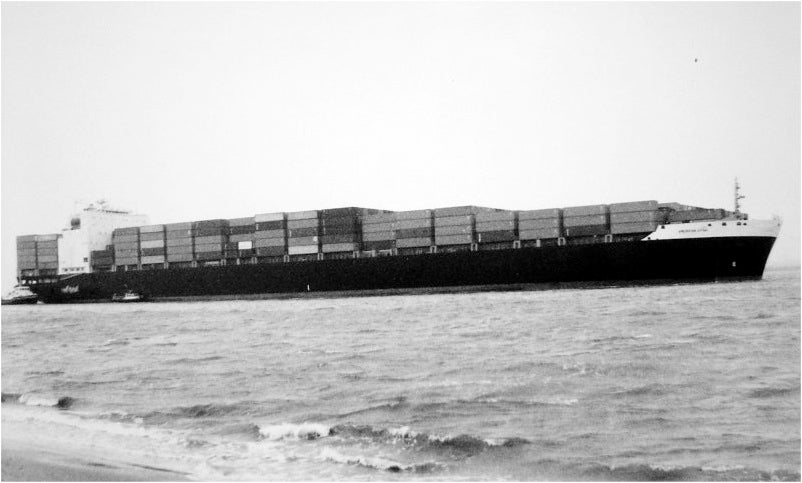
American Utah heading into Rotterdam, 1986 (credit: Gerhard Mueller-Debus, from Navsource.org)
Then, something unpredictable happened oil prices collapsed. Rather than double by 1985 as predicted, oil instead reached historic lows. All of a sudden, the whole justification for the Econships evaporated. Their fuel economy came at a price they were slow. Very slow. Capable of only 18 knots versus the typical 22-24, it took an Econship an additional 2 days to make the trip from North America to Europe and if bad weather was encountered en route, the ship would be even later, as it had no reserves of speed to call upon to make up the time. It was a disaster- United States Lines filed for bankruptcy in 1986, straining under the debt it had accumulated building its Econship fleet. The company attempted restructuring, but was unable to make the numbers work and ultimately shut down entirely in 1989, finally being dissolved in 1992 at the conclusion of the bankruptcy case. The failure of United States Lines sent shockwaves through the global shipping industry and ranked as the biggest bankruptcy filed in US history up to that time. Selling the Econships proved one of the biggest challenges of the restructuring process, ultimately the nearly new vessels had to be sold off for basically scrap value.
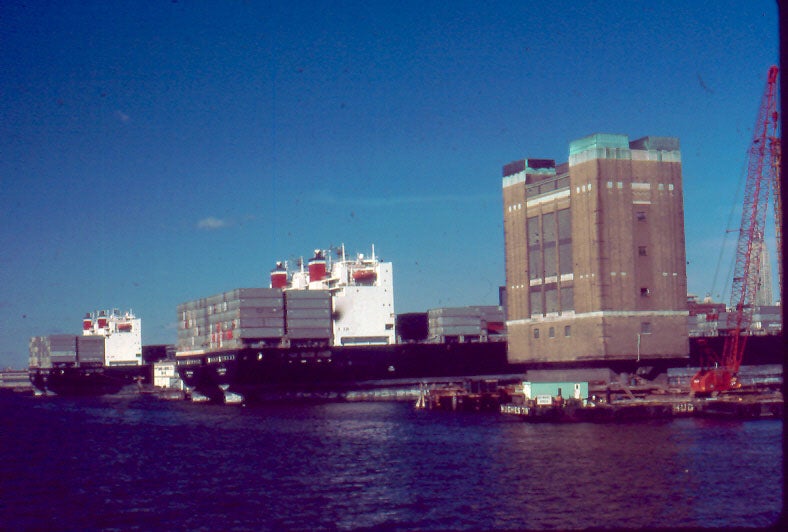
American Kentucky (scrapped 2009), American Nebraska (now Maersk Line's SSG Edward A. Carter Jr. ), American Maine (scrapped 2012), and American Virginia (scrapped 2011) laid up in New York awaiting sale, 1987 (credit: Theodore W. Scull, World Ship Society - Port of New York Branch)
Ironically, unencumbered by the high cost of building them in the first place, the ships went on to fairly long careers with other operators, and two of them are still sailing as of 2014, with the other 10 having all been scrapped in recent years after about a quarter century of service not overly long, but a reasonable life span for a container ship. A few of them were actually shortened in the mid 1990s, with the center section of the hull removed and the bow reshaped, cutting them down in size to about 47,000 tons, which increased the amount of ports they could access. With oil prices high again, slower and more economical ships once again have an advantage and many shipping companies are restricting speeds to reduce costs, so maybe the concept of container ship built specifically for no-holds-barred maximum fuel economy will be revisited.
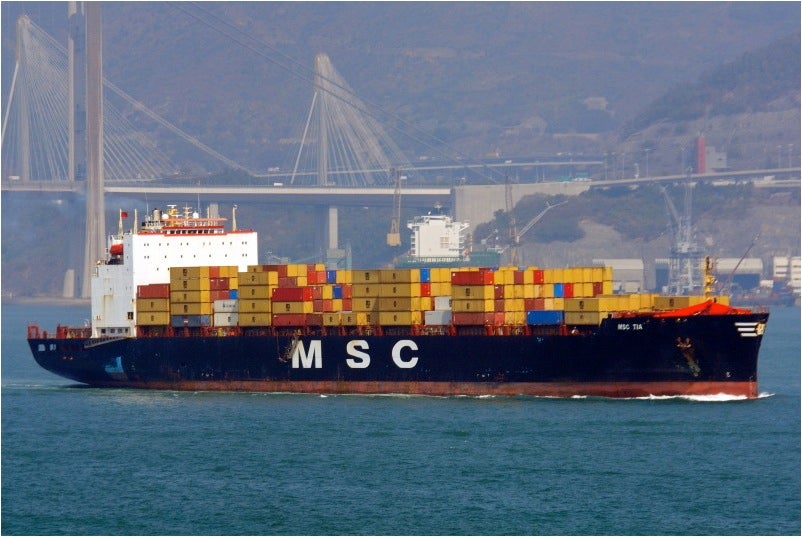
The former American Maine in service as MSC Tia for Mediterranean Shipping Company, after her 1990s rebuilding (credit: master1963 via FleetMon.com)
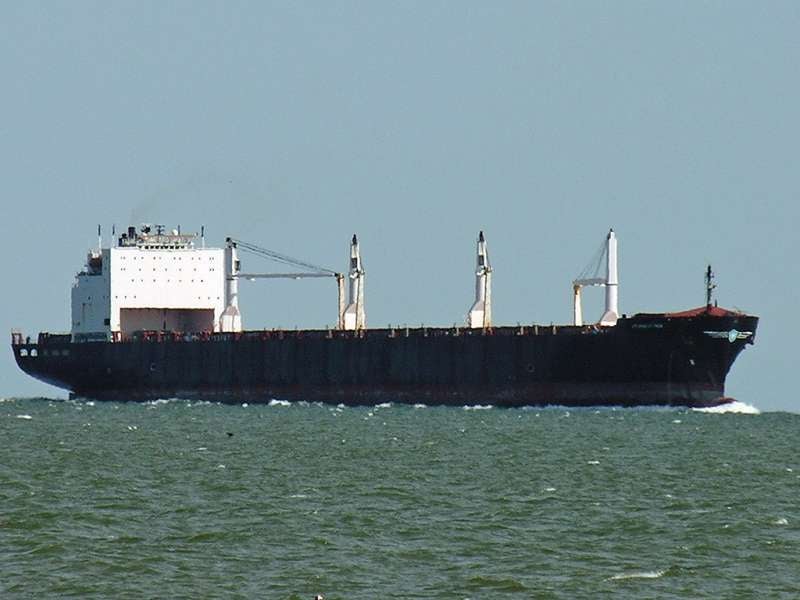
The former American Utah , in service as LTC John U.D. Page for Maersk Line, one of two of the type still operating (credit: GrimsB via shipspotting.com)
Jumbo Econship Class
American Alabama (1984) scrapped 2009 as Sea-Land Achiever
American California (1985) scrapped 2009 as Sea-Land Commitment
American Illinois (1985) scrapped 2009 as Sea-Land Quality
American Kentucky (1985) scrapped 2009 as Sea-Land Pride
American Maine (1984) scrapped 2012 as MSC Tia
American Nebraska (1985) in service as SSG Edward A. Carter Jr. for Maersk Line
American New Jersey (1984) scrapped 2009 as Sea-Land Motivator
American New York (1984) scrapped 2009 as Sea-Land Florida
American Oklahoma (1985) scrapped 2009 as Sea-Land Atlantic
American Utah (1985) in service as LTC John U.D. Page for Maersk Line
American Virginia (1984) scrapped 2011 as Sea-Land Integrity
American Washington (1985) scrapped 2010 as Sea-Land Performance
 FJ80WaitinForaLSV8
> ranwhenparked
FJ80WaitinForaLSV8
> ranwhenparked
08/02/2014 at 16:47 |
|
Great write up. I too am fascinated with the shipping industry and read G-captain every day. Never ceases to amaze me that except for jones-act carriers there are no american flagged carriers anymore. sad indeed.
 ranwhenparked
> FJ80WaitinForaLSV8
ranwhenparked
> FJ80WaitinForaLSV8
08/02/2014 at 17:12 |
|
And many of those that do exist are running positively ancient fleets - Horizon Lines has at least one ship dating to the '60s.
 FJ80WaitinForaLSV8
> ranwhenparked
FJ80WaitinForaLSV8
> ranwhenparked
08/02/2014 at 17:22 |
|
I believe they are still operating c6 and c7 class ships. Just shows how expensive it is to new build in US shipyards due to no economies of scale.
 ranwhenparked
> FJ80WaitinForaLSV8
ranwhenparked
> FJ80WaitinForaLSV8
08/02/2014 at 17:27 |
|
If you're politically well-connected enough, you can sometimes arm twist Congress into allowing exceptions - which was how United States Lines was able to build their Econships in South Korea and NCL America was able to use German built cruise ships in Hawaii, but in general, its pretty damn hard for American firms to get new ships.
That said, Aker Philadelphia Shipyard has managed to amass a surprisingly full order book at the moment, including a few new container ships for Matson. At some point, they get old enough that shear necessity trumps economic prudence.
 FJ80WaitinForaLSV8
> ranwhenparked
FJ80WaitinForaLSV8
> ranwhenparked
08/02/2014 at 17:35 |
|
I didn't realize Aker Philadelphia was also building container ships for Matson. I thought they were full up building oil tankers. VT Halter Marine of Pascagoula is building several LNG-powered ConRo ships for Crowley as well. Seems like most of the Jones act container carriers are finally reaching the point where they have to retire their surplus ready reserve fleets and are investing in their fleets.
 ranwhenparked
> FJ80WaitinForaLSV8
ranwhenparked
> FJ80WaitinForaLSV8
08/02/2014 at 17:45 |
|
Yep, they've got two more container ships lined up for 2018, but are basically full with tankers otherwise.
 orcim
> ranwhenparked
orcim
> ranwhenparked
08/03/2014 at 03:30 |
|
Wow. Another example of being ahead of your time and just guessing the timing wrongly, not the fact.
I guess I'm all for the so-called free market, but I really don't like the artificial perturbations speculation can do to market systems that are key to life itself like that 70's fuel crisis and subsequent market drama that turned out to be just that. Dunno how to deal with it, though, that's for sure.
 Cmakin
> ranwhenparked
Cmakin
> ranwhenparked
12/18/2014 at 08:18 |
|
I just stumbled across this article. I did follow my fascination and ended up working at sea, and even for Sea-Land for a bit. Once I came ashore, I worked for a Class Society and am very familiar with these Econ ships. In fact, Sea-Land bought many of them and they were running out of the Port of Houston, so I was onboard one almost every week. Sadly, the US merchant fleet is a mere shadow of its former self. Containerships, while invented in the US are now a largely foreign business. . . .
 surfaceblow
> ranwhenparked
surfaceblow
> ranwhenparked
06/09/2016 at 00:11 |
|
i worked for USL just before they went bankrupt they bought out MorMac and got into a price war with Evergreen which did not help its bottom line. At the end we had to keep broken parts and used light bulbs for the Port Engineer to determine if they were broken.